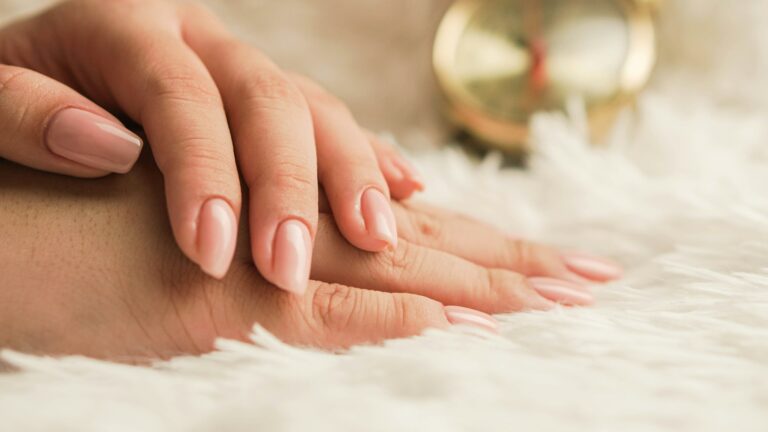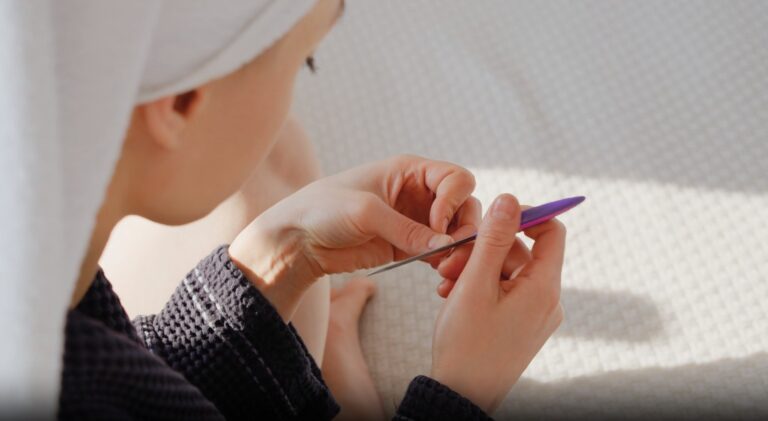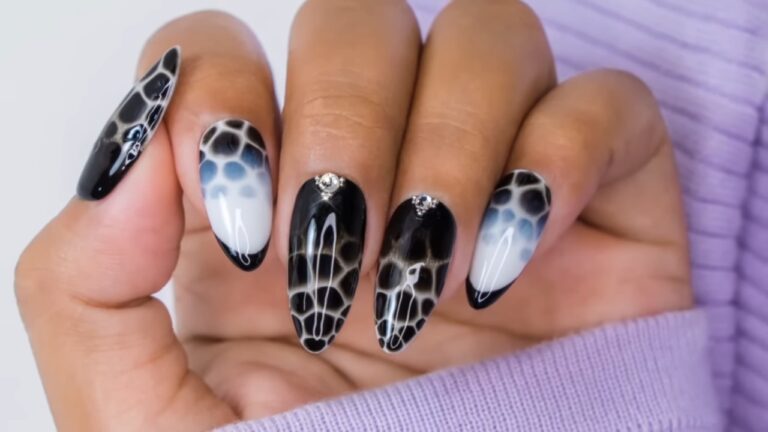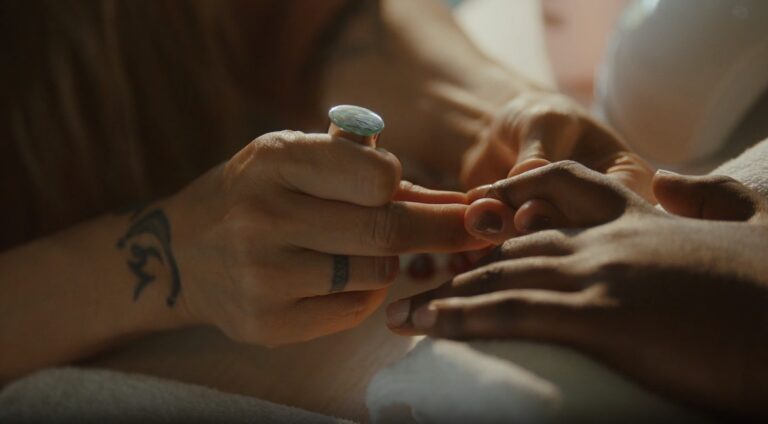We all love having a fresh mani, but lurking behind the glossy finishes and sparkling hues lies a question we seldom consider: does nail polish expire? The straightforward answer is yes, nail polish does expire. However, the story doesn’t end there. You need to understand their lifespan and recognize the signs of spoilage.
Typically, an unopened bottle of nail polish can last anywhere from 18 to 24 months, while an opened bottle is best used within 12 to 18 months. Let me tell you all about keeping your manis lasting as long as possible.
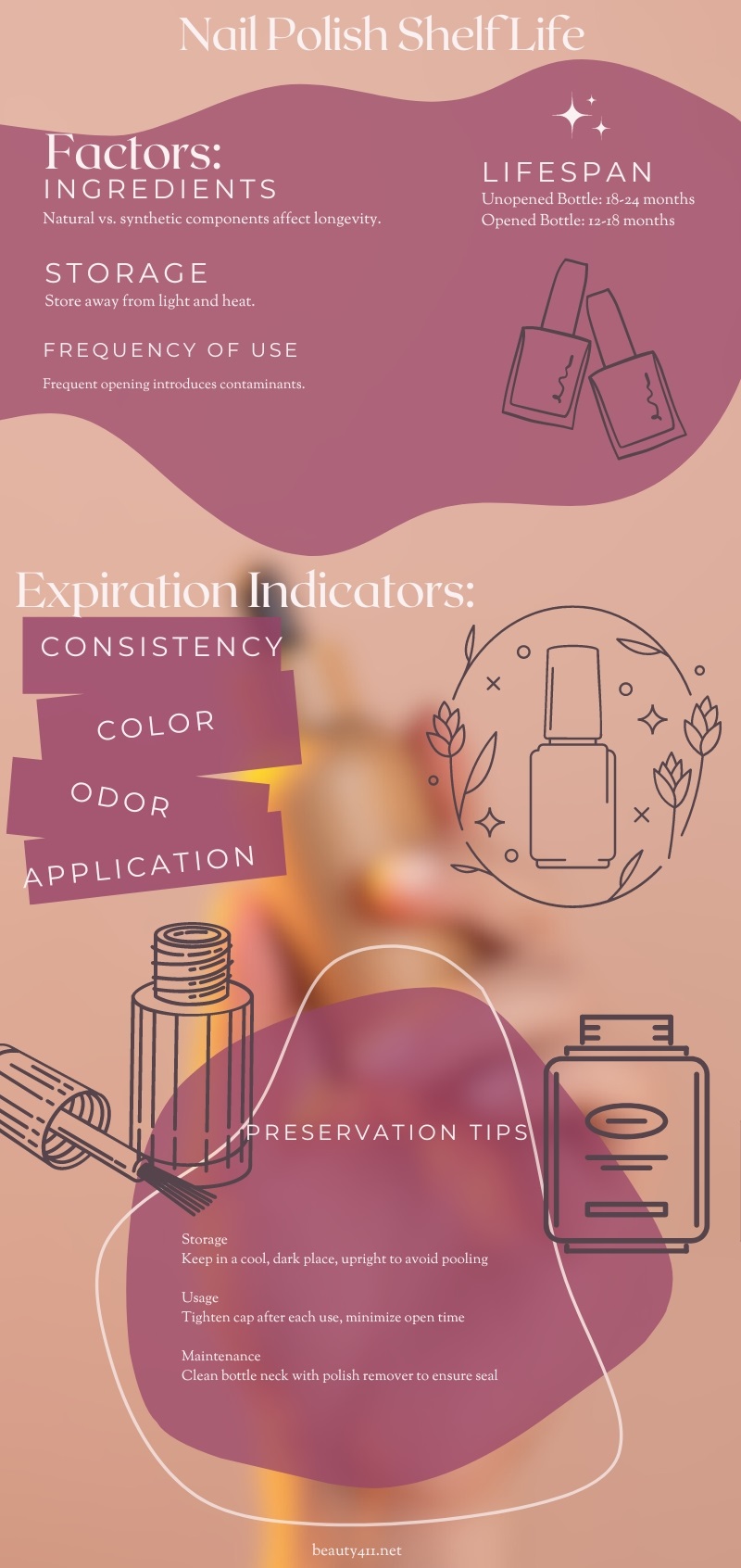
Which factors affect expiration?
1. Ingredients and formula
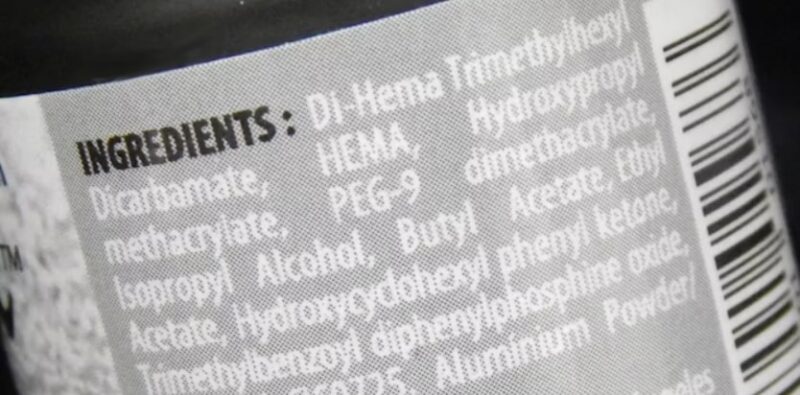
The longevity of nail polish is greatly influenced by its chemical makeup. Formulas rich in natural ingredients may lack the preservatives necessary to prolong shelf life, leading to a faster expiration than their synthetic counterparts. Moreover, specific pigments and additives can react differently over time, altering the stability of the product.
- Solvents: These keep the polish in a liquid state. Over time, they evaporate, causing the polish to thicken.
- Resins and plasticizers: These give the polish flexibility and strength. They can break down over time, affecting the polish’s performance.
- Pigments and dyes: These provide the color. Some can fade or change over time, especially when exposed to light.
2. Storage conditions
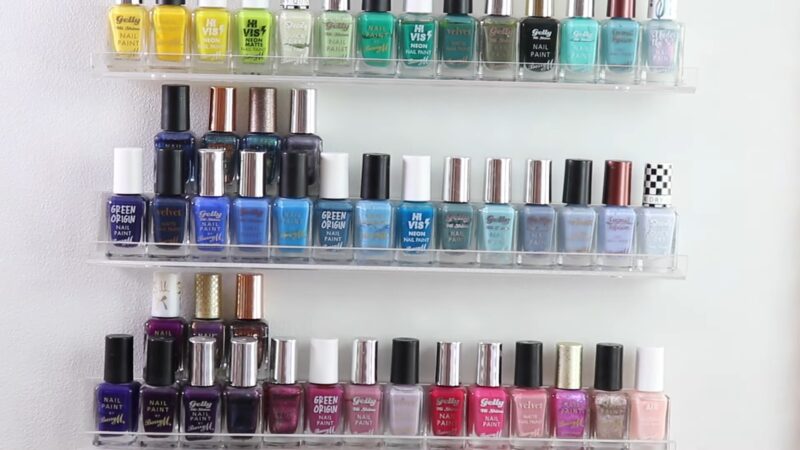
Nail polish is akin to a delicate potion; its integrity is jeopardized when exposed to adverse conditions. Not only can sunlight cause the pigments to fade, but heat can alter the viscosity of the formula, and air exposure can introduce bacteria, hastening the degradation process.
Thus, the environment where you keep your nail polish can be as crucial as the formula itself in determining its expiration.
3. Usage Frequency
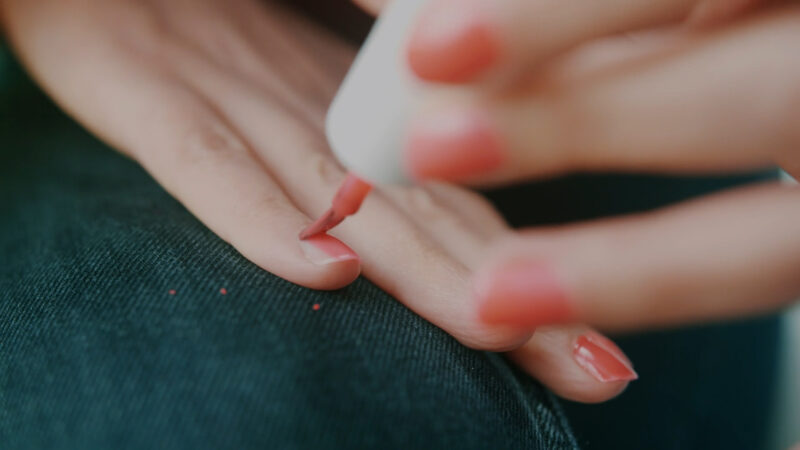
Each opening of a nail polish bottle invites microscopic intruders that can affect the formula’s purity. Regular use increases the risk of introducing these contaminants, which can compromise the product’s integrity and lead to premature expiration. Furthermore, frequent exposure to air can cause solvents in the polish to evaporate, changing its consistency.
What are the signs of expiration?
Consistency changes
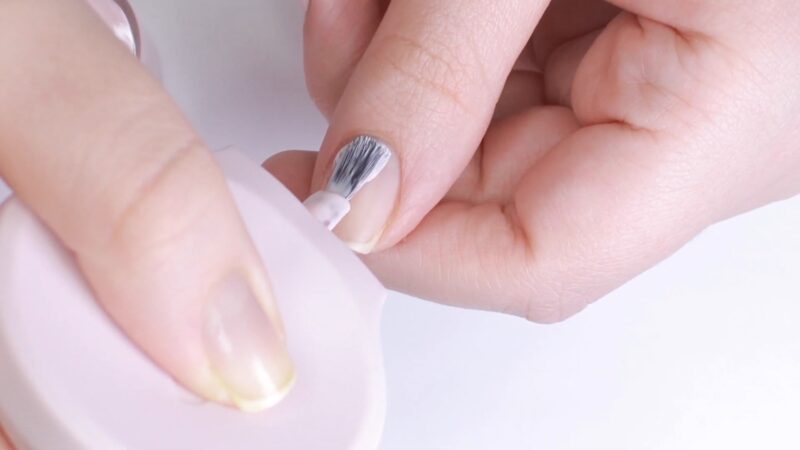
When nail polish begins to thicken or the ingredients separate in a way that shaking the bottle doesn’t rectify, it’s a clear sign the polish is past its prime. These consistency changes can make the polish difficult to apply evenly, affecting the manicure’s final appearance.
Sometimes, adding a few drops of nail polish thinner can temporarily mitigate these issues, but it’s often a sign to replace the bottle.
Color shifts
A vibrant polish that fades or changes color over time is signaling its decline. This can be especially disappointing if the shade is a favorite or was part of a limited edition. Such changes can affect the accuracy of the color when applied, leading to unexpected results.
Odor
Nail polish naturally has a strong scent due to the solvents it contains, but if you notice an unusual or significantly stronger chemical smell, it’s likely expired. This change in odor is a result of chemical degradation and is a clear indication that the polish should no longer be used.
Application difficulty
If the application of the polish becomes problematic, manifesting as streaking or difficulty in drying, the product’s effectiveness is compromised. These issues not only detract from the beauty of your manicure but can also lead to longer drying times and increased smudging risks.
Expiration
- Chemical Breakdown: Over time, the solvents in nail polish that keep it fluid evaporate, even when the bottle is closed. This evaporation process is natural but can be accelerated by factors such as frequent opening and poor storage conditions. As the solvent levels decrease, the remaining ingredients cannot maintain their intended consistency, leading to thickening or separation.
- Safety Concerns: Using expired nail polish can pose risks beyond just an unsatisfactory manicure. There’s a potential for bacterial growth in older bottles, which can lead to infections, especially if used on nails with cuts or weak spots. Moreover, the breakdown of chemicals can result in more harmful substances coming into contact with your skin or nails, compromising your nail health.
How to maximize your nail polish’s lifespan?
- Keep your nail polish in a cool, dark place, away from direct sunlight and heat sources. An upright position prevents the polish from pooling and sticking to the cap, ensuring a smoother application each time. This also reduces the risk of accidental spillage or contamination.
- Ensure the cap is tightly closed after each use to prevent air from entering the bottle, slowing down the evaporation of solvents. It’s also wise to limit the time the bottle is open during manicures to keep the polish in its best condition for longer.
- Regularly wiping the neck and threads of the bottle with nail polish remover can remove the accumulated product, ensuring a tight seal when closed and preventing contamination. This practice also aids in keeping the cap easy to open. Additionally, avoid sharing nail polish to reduce the introduction of new contaminants, keeping your polish safer for longer.
Myths and misconceptions
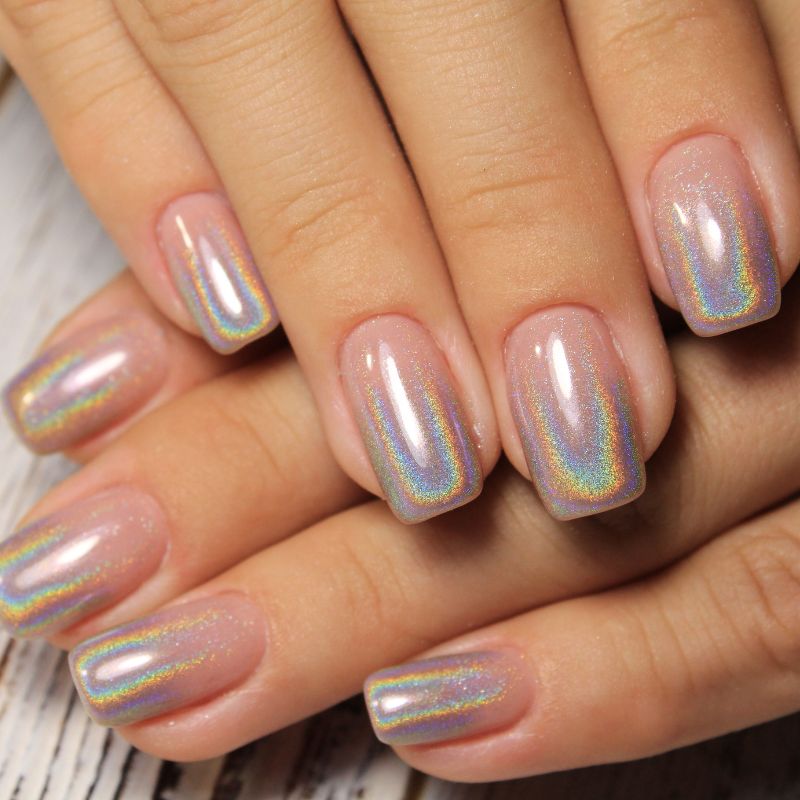
The remover will thin out thick polish
While this might seem like a quick fix, adding nail polish remover can actually break down the formula, making it less effective. Instead, invest in a nail polish thinner, which is designed to restore the polish’s consistency without compromising its quality.
Expired nail polish can harm your nails
While using expired polish won’t necessarily harm your nails, it can lead to a less-than-perfect manicure. The polish might not adhere well, leading to chipping or peeling. Additionally, if bacteria have been introduced, there’s a slight risk of nail infections.
The bottom line
Hope these tricks help you get the most out of your mani collection, girls! The best way to get the most out of any beauty product is to learn more details about it, including the real duration, proper disposal, and other important information. Now go give those nails some TLC – I’ll see you soon!
Related Posts:
- Does CeraVe Expire? The Ultimate Guide About…
- Nail Care Tips: Keeping Your Nails Healthy and Strong
- DIY Manicure: Steps for a Salon-Quality Finish at Home
- At What Age Does Acne Go Away? Insights for Teens and Adults
- 11 Benefits and Uses of Argan Oil: Transform Your…
- The Latest Trends in Nail Art To Be on the Lookout…





